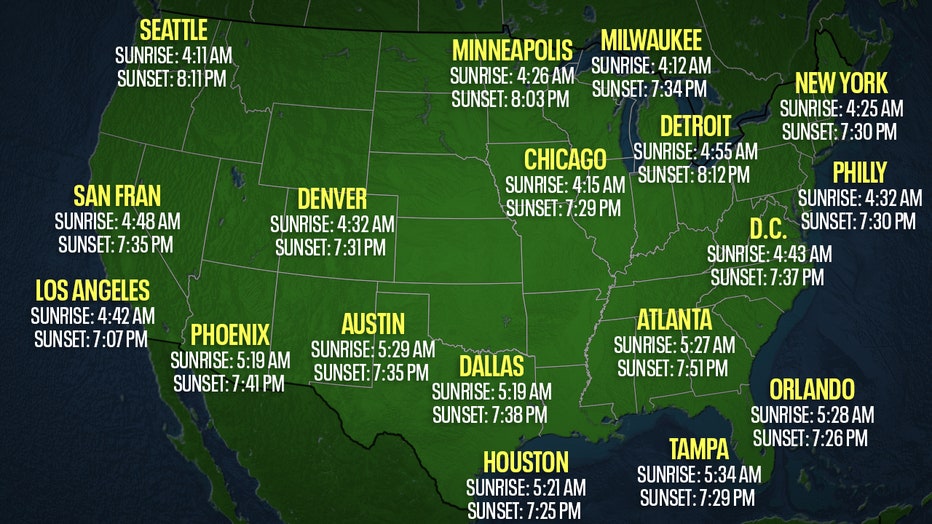Eliminating daylight saving time could mean dramatic changes to sunrise, sunset times
Trump calls daylight saving time 'inconvenient'
President-elect Donald Trump wants to eliminate daylight saving time. In a post on his social media site, Trump said his party would try to end the practice when he returns to office. LiveNOW's Andrew Craft spoke about the debate with Dan Diamond from The Washington Post.
Last week, President-elect Donald Trump said that he wants to eliminate Daylight Saving Time, calling it "inconvenient" and "very costly."
"The Republican Party will use its best efforts to eliminate Daylight Saving Time, which has a small but strong constituency, but shouldn’t!," Trump said on Dec. 13. "Daylight Saving Time is inconvenient, and very costly to our Nation."
Most countries do not observe daylight saving time. For those that do, the date that clocks are changed varies, creating a complicated tapestry of changing time differences. Arizona and Hawaii don’t change their clocks at all.
Setting clocks forward one hour in the spring and back an hour in the fall is intended to maximize daylight during summer months.
But the change has long been subject to scrutiny, and if enacted, it could mean a dramatic change to sunrise and sunset times.
Trump proposes to end daylight saving time
President-Elect Donald Trump says he will end daylight saving time when he steps into office come January 2025. LiveNOW from FOX's Josh Breslow spoke with Kenneth Wright, professor at University of Colorado Boulder, to discuss the impact that ending daylight saving time would have on Americans.
How DST elimination would affect sunrises, sunsets
Standard time is based on the natural position of the sun relative to the Earth. When the U.S. is on standard time, the sun rises and sets according to the clock time that aligns more closely with the Earth's natural rhythm.
Meanwhile, daylight saving time moves the clock forward by one hour during the spring and summer months, effectively shifting the day forward. This results in later sunsets (compared to standard time) and slightly later sunrises.
However, if daylight saving time was eliminated, and the U.S. stayed on standard time, sunrise would occur earlier in the summer. For example, if you're used to a sunrise at 7:00 a.m. under daylight saving time, it would happen at 6:00 a.m. under standard time.

June sunrises and sunsets without daylight saving time
In addition, sunset would also occur earlier than it does under daylight saving time. If you're used to a sunset at 8:00 PM under daylight saving time, it would happen at 7:00 PM under standard time.
In short, staying on standard time would cause both the sunrise and sunset times to shift earlier compared to what they are during daylight saving time during the summer. The main impact of this is that the evenings would feel darker earlier in the day, but mornings would be brighter earlier in the day.
If we stayed at standard time: June sunrises and sunsets
If we stayed at standard time in winter
Meanwhile, if the U.S. stayed on standard time year-round, winter sunrises and sunsets would stay as they are now.
Only the summer would see big changes because we would not "advance the clocks one hour" in the spring.
How daylight saving time affects your health
Some health groups, including the American Medical Association and the American Academy of Sleep Medicine, have said it's time to do away with time switches and that sticking with standard time year-round aligns better with the sun — and human biology.
RELATED: Daylight saving time: How springing forward could affect your health
But until this happens, experts suggest getting to bed a little earlier in the days leading up to daylight saving time to help gradually adjust to the time change.
Health effects of Daylight Saving Time
Daylight Saving Time (DST) can negatively impact health by disrupting sleep patterns, leading to potential issues like increased risk of heart attacks, strokes, workplace injuries, traffic accidents, mood disturbances, and cognitive impairment. Dr. Fahmi Farah, a cardiologist, joined LiveNOW from FOX to discuss.
"Stay active, maintain a regular exercise pattern or routine," Dr. Hitendra Patel, medical director of the Sleep Program at Wellstar Health System in Georgia, told FOX 5 Atlanta. "Try to avoid exercise late at night. Especially if a person is having difficulty sleeping, exercise earlier in the day."
Lawmakers propose changes to daylight saving time
Other lawmakers have previously proposed getting rid of the time change altogether.
The most prominent recent attempt, a now-stalled bipartisan bill, named the Sunshine Protection Act, would ensure Americans would no longer have to change their clocks twice a year. And while the goal was to enact said bill by 2023, things haven’t really gone to plan.

Sun rises on February 06, 2024, in Washington, DC. (Credit: J. David Ake/Getty Images)
In October, U.S. Senator Marco Rubio (R-FL) released a statement in support of making daylight saving time permanent.
"It’s time to lock the clock and stop enduring the ridiculous and antiquated practice of switching our clocks back and forth. Let’s finally pass my Sunshine Protection Act and end the need to ‘fall back’ and ‘spring forward’ for good," he said.

